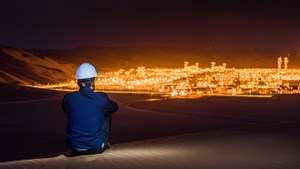Saudi Aramco follows Big Oil rivals with bumper earnings
(Bloomberg) — Saudi Aramco’s profit soared in the first quarter following a recovery in global oil and gas markets, though free cash flow remained too low to fully cover dividend payments.
The world’s biggest energy company kept its quarterly payout, almost all of which goes to the Saudi government, at $18.75 billion. The money is vital for the kingdom as it tries to narrow a budget deficit that ballooned last year, with the coronavirus pandemic sinking oil prices and shutting down local businesses.
The bumper results follow those last week of Big Oil rivals such as Royal Dutch Shell Plc and BP Plc, whose earnings are back to pre-pandemic levels as major economies reopen and more people are vaccinated. Brent crude has gained more than 30% this year to top $68 a barrel.
“There are more reasons to be optimistic that better days are coming,” Chief Executive Officer Amin Nasser said in a statement Tuesday. “The momentum provided by the global economic recovery has strengthened energy markets.”
Net income for the quarter was 78.6 billion riyals ($21 billion), up 24% year-on-year and higher than analysts’ average estimate of roughly $19 billion. Free cash flow was $18.3 billion. The company expects capital expenditure to be $35 billion in 2021, a figure unchanged from its forecast in March.
Aramco, based in Dhahran in eastern Saudi Arabia, saw its debt load spike after earnings collapsed last year with the spread of the pandemic and it opted to maintain the $75 billion annual dividend.
Gearing Unchanged
Gearing, a measure of net debt to equity, increased from minus 5% in early 2020 to 23% by the end of the year as Aramco borrowed to fund the dividend and buy a $69 billion stake in chemicals maker Saudi Basic Industries Corp. from the kingdom’s sovereign wealth fund. The debt ratio remained the same at the end of March, but may fall this quarter because a U.S.-led group agreed to invest $12.4 billion in Aramco’s oil pipelines. The Saudi company is also considering selling a stake linked to its natural-gas pipelines.
“Saudi Aramco’s cash-generation outlook is improving with higher benchmark oil prices, suggesting the company may be able to cover this year’s $75 billion dividend with free cash flow,” Bloomberg Intelligence analysts Salih Yilmaz and Rob Barnett said in a note. “Any excess free cash could be used to deleverage.”
Aramco’s downstream business, which now includes contributions from Sabic, swung to a profit as higher commodity prices boosted margins for refined products such as transport fuels and plastics. The unit’s earnings before interest and tax were $4.4 billion, compared with a loss of $5 billion a year earlier.
The downstream arm, which Aramco wants to expand further, posted full-year losses in 2019 and 2020.
The upstream business, mainly consisting of oil and gas production, saw earnings before interest and tax rise 6.4% to $40 billion. While it was buoyed by higher energy prices, Saudi Arabia’s OPEC commitments meant Aramco reduced crude output during the quarter to an average of 8.6 million barrels a day. That’s the lowest in a decade.
OPEC Hit
The Organization of Petroleum Exporting Countries and its allies -- a 23-nation grouping known as OPEC+ -- began unprecedented supply cuts last year to bolster prices. Saudi Arabia, the cartel’s de facto leader along with Russia, is implementing extra curbs on top of what OPEC requires, though it plans to end them by July.
Despite the production decline, Aramco’s capital expenditure is mostly directed toward pumping more oil. Upstream capex rose by 19%, while downstream spending dropped 15%. The company has been instructed by the Energy Ministry to expand oil-production capacity to 13 million barrels a day from 12 million.
The Saudi government may sell more shares in Aramco over the next two years as it looks to transfer cash to the sovereign wealth fund, which aims to become one of the world’s largest with more than $2 trillion of assets.
The kingdom is in talks to divest a 1% stake, worth around $19 billion, to a “leading” energy company, Crown Prince Mohammed Bin Salman said last month. It may also sell some more Aramco shares on the local stock exchange, he said. The government raised almost $30 billion in 2019 when it listed 2% of the firm on the Riyadh bourse.
Aramco’s shares rose 0.6% to 35.6 riyals at 1:42 p.m. in the Saudi capital, extending their gain this year to 1.7%.



